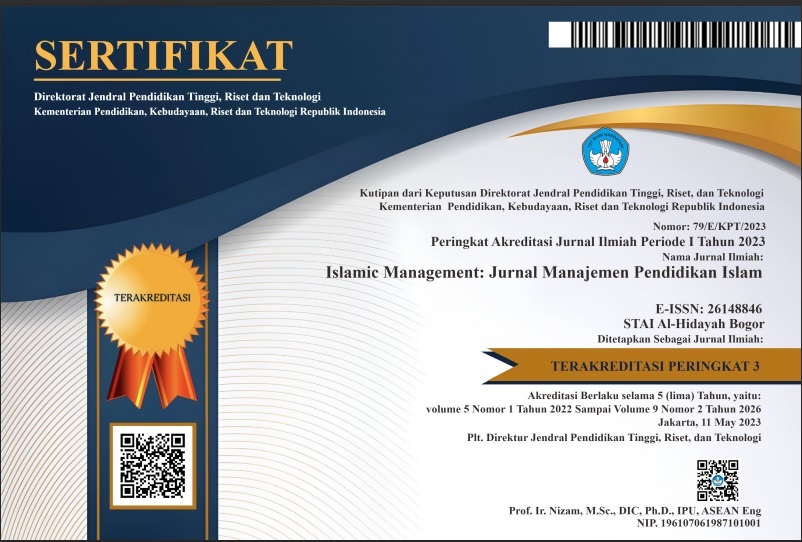ROLE OF ALUMNI IN THE PROGRAM MENTORSHIP TO SUPPORT INTERNATIONAL ACHIEVEMENTS
Phenomenological Study At Mts Abadiyah Pati
DOI:
https://doi.org/10.30868/im.v8i02.8567Keywords:
alumni, mentorship program, international achievements, madrasah, phenomenological studiesAbstract
This study aims to examine the role of alumni in the mentorship program to support the international achievements of MTs Abadiyah Pati students. Specifically, exploring the dynamics of alumni involvement in assisting madrasah students to compete at the global level, as well as identifying key factors that influence the effectiveness of the mentorship program in the context of Islamic education. The method used is a qualitative approach with a phenomenological design. Data collection was carried out through in-depth interviews, participant observation, and analysis of program documents during the period 2018-2023. The study involved 12 key informants consisting of alumni mentors, international high-achieving students, and mentorship program managers. Data were analyzed using thematic analysis techniques to identify patterns of alumni roles and their impacts. The results of the study revealed that alumni play three main roles in the mentorship program: (1) inspiring role models who break stereotypes about the limitations of madrasa graduates, (2) academic mentors who facilitate the transfer of knowledge and competition strategies, (3) a central role as international network facilitators who open access to global resources, psychological-emotional supporters who understand the specific pressures and challenges of madrasa students. These findings indicate that the alumni mentorship program plays a significant role in improving student achievement in international competitions in science, technology, and arts and culture. Further research recommendations require a study of the impact of the mentorship program on academic and professional journeys to expand the reach and positive impact of alumni on madrasa students throughout Indonesia.
References
Allen, T. D., Eby, L. T., Chao, G. T., & Bauer, T. N. (2017). Taking stock of two relational aspects of organizational life: Tracing the history and shaping the future of socialization and mentoring research. Journal of Applied Psychology, 102(3), 324-337.
Creswell, J. W., & Poth, C. N. (2018). Qualitative inquiry & research design: Choosing among five approaches (4th ed.). SAGE Publications.
Fathurrohman, M. (2019). Peran alumni dalam pengembangan madrasah di Indonesia: Studi kasus di tiga provinsi. Jurnal Pendidikan Islam, 5(2), 87-104.
Fauzi, A. (2018). Faktor-faktor penentu keberhasilan siswa madrasah dalam kompetisi internasional. Jurnal Pendidikan Islam, 7(1), 41-58.
Hafiduddin, D. (2012). Pendidikan karakter berbasis tradisi pesantren. Reneka Cipta.
Khairuddin, M. (2018). Mentorship dalam tradisi pendidikan Islam: Dari konsep ke implementasi. Jurnal Tarbiyah, 25(1), 168-187.
Kram, K. E. (1983). Phases of the mentor relationship. Academy of Management Journal, 26(4), 608-625.
Lubis, M. A., & Wekke, I. S. (2016). Integrated Islamic education in Brunei Darussalam: The hopes and challenges. EDUCARE: International Journal for Educational Studies, 8(2), 91-106.
Memon, J., Rozan, M. Z. A., Ismail, K., Uddin, M., & Daud, D. (2014). Mentoring an entrepreneur: Guide for a mentor. SAGE Open, 4(1), 1-10.
Moustakas, C. (1994). Phenomenological research methods. SAGE Publications.
Rahmawati, S. (2020). Model pelibatan alumni dalam pengembangan madrasah di era disrupsi. Jurnal Manajemen Pendidikan Islam, 3(2), 221-238.
Rhodes, J. E. (2005). A model of youth mentoring. In D. L. DuBois & M. J. Karcher (Eds.), Handbook of youth mentoring (pp. 30-43). SAGE Publications.
Suhardi, D. (2018). Peran pendidikan dalam meningkatkan daya saing bangsa di era global. Jurnal Ilmiah Pendidikan, 2(1), 43-57.
Weerts, D. J., & Ronca, J. M. (2008). Characteristics of alumni donors who volunteer at their alma mater. Research in Higher Education, 49(3), 274-292.
Downloads
Published
How to Cite
Issue
Section
Citation Check
License
Copyright (c) 2025 Abdul Kalim, Islah Islah, Sujito Sujito

This work is licensed under a Creative Commons Attribution-ShareAlike 4.0 International License.
Authors who publish with this journal agree to the following terms:
- Authors retain copyright and grant the journal right of first publication with the work simultaneously licensed under a Creative Commons Attribution License that allows others to share the work with an acknowledgment of the work's authorship and initial publication in this journal.
- Authors are able to enter into separate, additional contractual arrangements for the non-exclusive distribution of the journal's published version of the work (e.g., post it to an institutional repository or publish it in a book), with an acknowledgment of its initial publication in this journal.
- Authors are permitted and encouraged to post their work online (e.g., in institutional repositories or on their website) prior to and during the submission process, as it can lead to productive exchanges, as well as earlier and greater citation of published work (See The Effect of Open Access).






